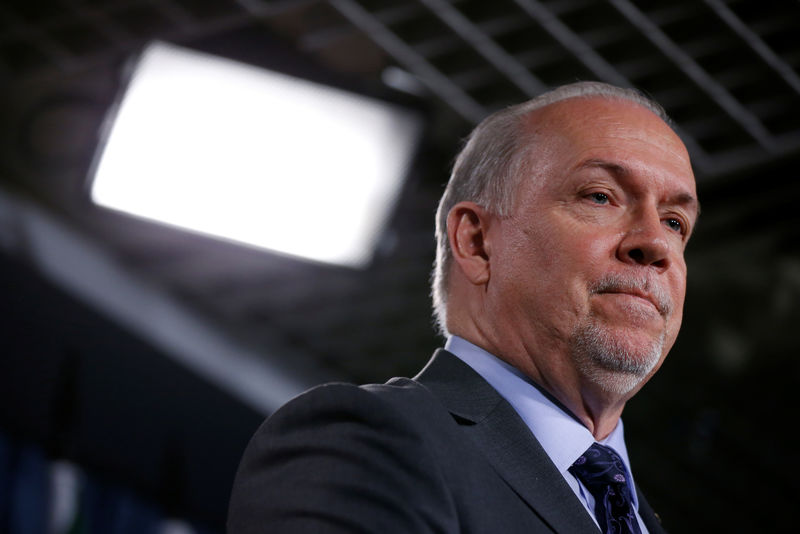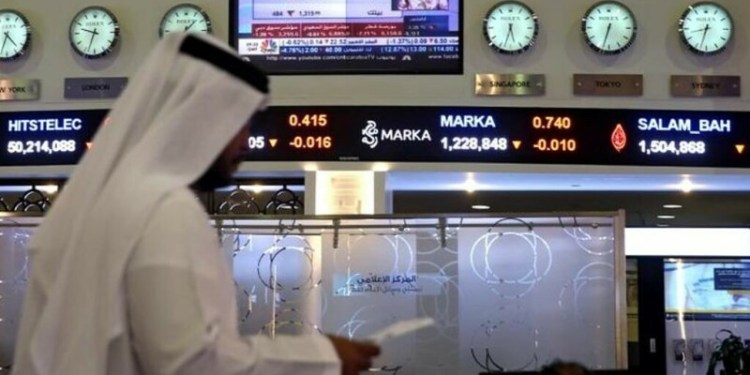 © Reuters. B.C. Premier Horgan takes part in a news conference in Ottawa
© Reuters. B.C. Premier Horgan takes part in a news conference in OttawaBy David Ljunggren
OTTAWA (Reuters) – Canadian Prime Minister Justin Trudeau on Sunday moved to end an escalating crisis over a Kinder Morgan Canada Ltd (TO:) oil pipeline, saying Ottawa was prepared to offer financial aid to ensure the project went ahead.
Trudeau cited investor confidence as one reason to help Kinder Morgan Canada, part of Kinder Morgan Inc (N:), which plans to almost triple the capacity of its Trans Mountain line from Alberta to the Pacific province of British Columbia.
The company, unhappy about moves by the British Columbia government to impede the C$7.4 billion ($5.9 billion) project on environmental grounds, is threatening to walk away unless it receives sufficient clarity about the path ahead by May 31.
“I have instructed the minister of finance to initiate formal financial discussions with Kinder Morgan, the result of which will be to remove the uncertainty overhanging the Trans Mountain pipeline expansion project,” Trudeau told reporters, calling the line “a vital strategic interest to Canada.”
Trudeau, speaking after an emergency summit with the premiers of Alberta and British Columbia, said “we are actively pursuing legislative options that will assert and reinforce the government of Canada’s jurisdiction in this matter.”
He declined to give details on exactly what the ruling Liberals had in mind to end an impasse that is prompting investor unease and could threaten his political future.
Both the federal and Alberta governments have already suggested they could take a stake in the project.
Speaking before the meeting, a federal government source said past examples of help included a bailout of the auto industry in 2009, federal loan guarantees for a hydro-electric project and Ottawa’s investment in an offshore energy project.
“Construction will go ahead,” said Trudeau, who is under increasing pressure from the business community and opposition politicians to take action amid fears the dispute could hit already flagging foreign investment.
Kinder Morgan Canada said it would not comment on Trudeau’s remarks “until we’ve reached a sufficiently definitive agreement on or before May 31 that satisfies our objectives.”
Many in the energy industry are concerned about whether quarrels over jurisdiction and increasingly vehement protests mean any new pipelines can be built in Canada, which sits on the world’s third-largest proven reserves of crude and is the single largest exporter of energy to the United States.
The lack of pipeline capacity means Canadian crude trades at a discount to the U.S. oil benchmark ().
Environmentalists and aboriginal activists frequently demonstrate at Trans Mountain facilities and British Columbia police have arrested about 200 people since mid-March.
“The federal government can’t buy off the opposition to this failing pipeline … the resistance continues to grow,” said Mike Hudema of Greenpeace Canada.
Although Trudeau’s Liberal government could invoke emergency powers to ensure the project goes ahead, that would most likely anger voters in British Columbia and cost the Liberals support in a federal election in October 2019.
Alberta Premier Rachel Notley, who also attended the talks in Ottawa, said she was convinced the expansion would be built if the financial assistance deal could be worked out.
British Columbia Premier John Horgan said after the meeting he had not changed his position that the risks of a spill from the pipeline were too great.
Horgan wants Ottawa to refer the matter to the Supreme Court but the Liberals are not interested, saying it is already clear the federal government has jurisdiction over the project.
Horgan also said he would ask the courts in British Columbia to make clear how much powers the province had to protect the provincial environment. Federal officials complain this is a time-wasting tactic.
($1=1.2598 Canadian dollars)
Source: Investing.com




























